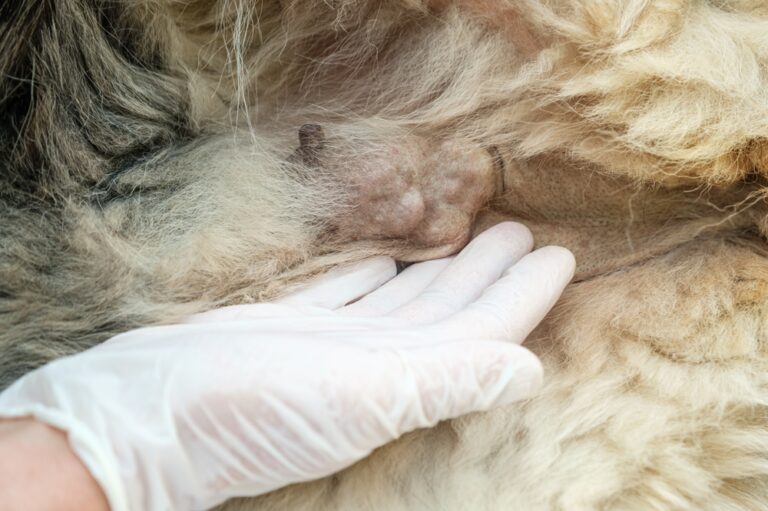5 Symptoms Your Shih Tzu Might Be Dying!
Imagine coming home to find your beloved Shih Tzu less energetic than usual. It might seem like a lazy day for your furry friend, but what if it’s something more serious? Our pets often tell us they’re not feeling well through small changes, like not eating or looking sad, but sometimes these signs are easy to miss.
This article will explore five severe warning signs that your Shih Tzu might face a health emergency. These signs are crucial for every Shih Tzu owner to recognize because spotting them early can make a huge difference. We’ll thoroughly explain each symptom so you can understand precisely what to watch out for, ensuring your pet stays as happy and healthy as possible. Keep reading to learn how you can be the best guardian for your furry family member!
1. Sudden Weight Loss
Have you noticed your Shih Tzu doesn’t seem as plump or fluffy as before? Sudden weight loss in your furry friend isn’t just about a number on a scale—it’s a warning bell that shouldn’t be ignored. Whether it’s a slight decrease in their weight or if they’re shedding pounds rapidly, it’s crucial to understand why this change is happening.
Why Sudden Weight Loss is a Critical Sign
Losing weight quickly without an apparent reason can be alarming because it often suggests that your pet isn’t just off their food; they might be battling an illness. Conditions that could cause weight loss include digestive issues, which prevent nutrients from being absorbed properly, or more severe illnesses like diabetes or kidney disease. Sometimes, even emotional problems, such as stress or depression, can lead to weight loss.
How to Monitor Your Shih Tzu’s Weight Effectively
- Maintain a Routine Check: It’s a good idea to weigh your Shih Tzu regularly. A digital scale is best because it allows you to see even small changes that might be easy to miss otherwise.
- Keep a Food Diary: Track what and how much your Shih Tzu eats daily. A sudden disinterest in food, especially their favorite treats, is a significant red flag.
- Observe Daily Activities: Pay close attention to your Shih Tzu’s daily activities. Are they playing less? Do they seem tired more often? Changes in behavior are usually parallel with physical health issues.
- Consult Your Veterinarian: If you notice that your Shih Tzu is losing weight, it’s essential to consult with a vet as soon as possible. They can conduct a comprehensive health check-up, including blood tests and physical exams, to determine the root cause of the weight loss.
By staying vigilant and proactively monitoring your Shih Tzu’s health, you can catch critical health issues early and provide your pet with the best care possible. Remember, your attention to their health could make all the difference.
2. Unexplained Lethargy
When your lively Shih Tzu starts showing a surprising lack of interest in playing or even greeting you at the door, it’s natural to be concerned. This isn’t just about a lazy day; it’s about a noticeable decrease in energy that doesn’t seem to improve with rest. This lethargy condition can be a subtle yet profound red flag that something is amiss with your furry companion’s health.
Why Lethargy Signals a Health Concern
Lethargy in Shih Tzus can indicate various underlying health issues, from the mundane to the serious. It may be as simple as a reaction to medication or as grave as heart disease or infection. What’s critical is that lethargy often points to conditions that require medical attention, such as metabolic disorders, severe infections, or even organ failure.
Distinguishing Between Normal Tiredness and Lethargy
- Reaction to Daily Activities: It’s normal for your Shih Tzu to feel tired after a long walk or a vigorous play session, but they should recover after some rest. If your dog continues to seem disinterested and sluggish well into the day or the next day, this is a sign of something more than just tiredness.
- Impact on Daily Routines: Watch how lethargy affects daily routines. A tired Shih Tzu might skip a toy toss but still show interest in meals and greetings. In contrast, a lazy dog might ignore meal times, show disinterest in favorite treats, or respond to calls and commands more than usual.
- Additional Health Signs: Observe if other symptoms, such as coughing, heavy breathing, a change in bathroom habits, or unusual whining, accompany the lethargy. These signs can help differentiate normal tiredness from a more passive, severe state that needs veterinary attention.
Understanding the nuances between a tired pet and one that’s lethargic is vital. Continuous, unexplained lethargy is a severe signal that your Shih Tzu might be unwell, potentially suffering from a condition that could deteriorate if left unchecked. If your pet shows these signs, a visit to the vet can ensure they get the care they need to return to their playful, energetic self.
3. Difficulty Breathing
Noticing that your Shih Tzu is having trouble catching their breath can be alarming. This issue, known technically as dyspnea, is more than a temporary pain after a lively game; it’s a sign that your pet could be experiencing severe health problems. Act quickly, as respiratory distress can escalate rapidly, affecting your pet’s overall health and vitality.
Why Immediate Attention is Needed
Various severe conditions, such as bronchitis, pneumonia, heart disease, or choking hazards, can cause breathing problems in Shih Tzus. These conditions interfere with the normal uptake of oxygen, which is crucial for your pet’s cells and organs to function correctly. Without sufficient oxygen, your pet’s health can quickly deteriorate, making any signs of breathing difficulty a critical concern.
How to Recognize and React to Breathing Problems
- Watch for Abnormal Signs: Normal panting is common, especially after exercise or in heat, but if you notice your Shih Tzu struggling to breathe, gasping for air, or using their abdomen to help them breathe, it’s time to be concerned.
- Listen for Noises: Attention is to unusual sounds, such as wheezing, straining, or a high-pitched breath sound. These can indicate something wrong with the respiratory system, such as a blockage or inflammation.
- Immediate Steps to Take: If your Shih Tzu shows signs, assess the situation quickly.
- Offer them a calm environment and remove potential stressors that could exacerbate breathing problems.
- Do not attempt home remedies or wait for symptoms to improve.
- If signs occur outside of regular business hours, contact your veterinarian immediately or take your pet to an emergency animal clinic.
- Emergency Signs: Seek immediate veterinary attention if your pet cannot settle, seems anxious or panicked, or if their tongue or gums turn a shade of blue, purple, or white. These are signs of oxygen deprivation and require urgent care.
Understanding what constitutes normal and abnormal breathing in your Shih Tzu will help you react swiftly to potential emergencies. Quick, informed actions can be life-saving and give your pet the best chance to recover. Always err on caution and consult with your veterinarian when in doubt.
4. Changes in Eating or Drinking Habits
When your Shih Tzu starts showing different habits around their food bowl or water dish, paying attention is essential. These changes might initially seem small, like skipping a meal or two or drinking more water than usual. However, such variations can be early signs of health issues that need addressing. Understanding what’s normal for your pet and recognizing deviations can help you take timely action to ensure their well-being.
Analyzing Changes in Appetite and Water Consumption
Changes in how much your Shih Tzu eats or drinks can point to several potential health concerns:
- Reduced Appetite: This could be as simple as disliking a new food brand or as severe as gastrointestinal blockages or systemic infections. A decrease in appetite is particularly concerning if it lasts more than a couple of days or is accompanied by other symptoms like lethargy or vomiting.
- Increased Appetite: Sometimes overlooked, an increase in appetite can indicate issues such as nutrient malabsorption, where the body can’t properly extract the nutrients it needs from food, leading to increased hunger. It might point to psychological factors such as stress or anxiety.
- Changes in Drinking Habits: An increase in thirst can be symptomatic of conditions like diabetes or kidney disease, which can cause the body to require more fluids. Conversely, decreased drinking might suggest nausea or decreased body function efficiency.
Guidance on Normal Feeding and Drinking Patterns
- Set a Baseline: Understand and document your Shih Tzu’s normal consumption levels under regular conditions. This baseline will help you notice when there are significant shifts in their eating or drinking habits.
- Consistent Observation: Regularly observe your pet’s behavior at mealtime. Is your Shih Tzu suddenly indifferent towards the food they once enjoyed? Do they drink water excessively after a regular walk? These observations are crucial.
- Consult Your Vet: Any sudden or unexplained changes in eating or drinking habits should prompt a consultation with your veterinarian. This is especially important if the habit change includes other signs of distress or illness.
- When to Worry: Be particularly vigilant if changes in eating or drinking habits are sudden, severe, or associated with other worrying symptoms. Don’t wait to see if they “get better”—early vet intervention can make a big difference.
By monitoring your Shih Tzu’s eating and drinking habits and knowing when these changes warrant concern, you can proactively manage their health. Catching and addressing health issues early is crucial in preventing them from becoming severe, ensuring your beloved pet remains healthy and vibrant.
5. Unusual Gastrointestinal Symptoms
When your Shih Tzu starts showing signs like vomiting or diarrhea, it’s crucial to take note. These symptoms may result from eating something inappropriate but can also indicate something more serious. Knowing what to watch for and how to react can save your pet from discomfort or potentially life-threatening conditions.
Recognizing Gastrointestinal Distress
Vomiting and diarrhea in Shih Tzus can vary in severity and frequency, which can provide clues to the seriousness of their condition:
- Vomiting: If your Shih Tzu vomits once and then resumes normal behavior, it may not be urgent. However, persistent vomiting, especially if it involves multiple episodes in a short period or vomiting combined with other symptoms like lethargy or refusal to eat, demands immediate attention.
- Diarrhea: Occasional loose stools might not require a vet visit, but watch for diarrhea that is frequent, bloody, or accompanied by a foul smell. These signs can point to significant issues, especially when combined with decreased energy or appetite.
- Other Warning Signs: Symptoms such as a bloated abdomen, excessive drooling, or signs of pain (like whimpering or restlessness) when the abdomen is touched should be treated as emergencies.
Steps to Take for Gastrointestinal Issues
- Immediate Care: If symptoms are mild, ensure your Shih Tzu can access clean water to prevent dehydration. You might also simplify their diet to boiled chicken and plain rice to ease their stomach.
- Observe and Document: Monitor your pet’s frequency of vomiting or diarrhea and note any other unusual symptoms that co-occur. Documenting these details can significantly assist your vet in diagnosing the problem.
- Preventative Measures: Ensure your Shih Tzu doesn’t eat food that isn’t part of its regular diet, like table scraps or garbage, which can upset its stomach.
- Seek Veterinary Help:
- Immediately if there is persistent vomiting or diarrhea several times in a day.
- If symptoms include visible blood or your pet appears in pain.
- If your Shih Tzu shows signs of dehydration (like dry gums, sunken eyes, or lethargy), do not hesitate to seek medical attention, as this can quickly become critical.
By understanding these symptoms and knowing when they require a vet’s attention, you can ensure the health and well-being of your Shih Tzu. Prompt action and careful monitoring are vital in managing gastrointestinal issues effectively and keeping your beloved pet happy and healthy.
Conclusion
Care is essential to maintain their health and happiness. Watch for signs such as sudden weight loss, unexplained lethargy, difficulty breathing, changes in eating habits, and unusual gastrointestinal symptoms, as these can be early warnings of severe health issues. Regular veterinary check-ups are vital, helping detect and treat potential problems early. Always act promptly if you notice any of these symptoms and maintain an open line of communication with your vet, ensuring your Shih Tzu remains healthy and happy.
FAQ,s
What are the common causes of sudden weight loss in Shih Tzus?
Sudden weight loss can be caused by various factors, including dental issues, diabetes, infections, parasites, or even cancer. If you notice your pet is losing weight unexpectedly, it’s essential to consult a veterinarian.
How can I tell if my Shih Tzu is just tired or lethargic?
If your Shih Tzu is lazy, it will lack energy over several days, not just after activity. Other symptoms like reduced appetite or a lack of interest in usual activities often accompany lethargy.
What should I do if my Shih Tzu has difficulty breathing?
If your Shih Tzu shows signs of difficulty breathing, such as wheezing, constant coughing, or labored breathing, seek immediate veterinary care, as this could indicate serious respiratory issues.
Are changes in eating or drinking habits always a sign of illness?
While changes can sometimes be attributed to new food or environmental modifications, persistent increases or decreases in appetite and water consumption can indicate illness, especially if accompanied by other symptoms.
What immediate actions should I take if my Shih Tzu shows gastrointestinal distress?
If your Shih Tzu experiences vomiting or diarrhea, ensure they stay hydrated and avoid feeding them for a few hours. If symptoms persist or are accompanied by other signs like lethargy or pain, contact your veterinarian immediately.










